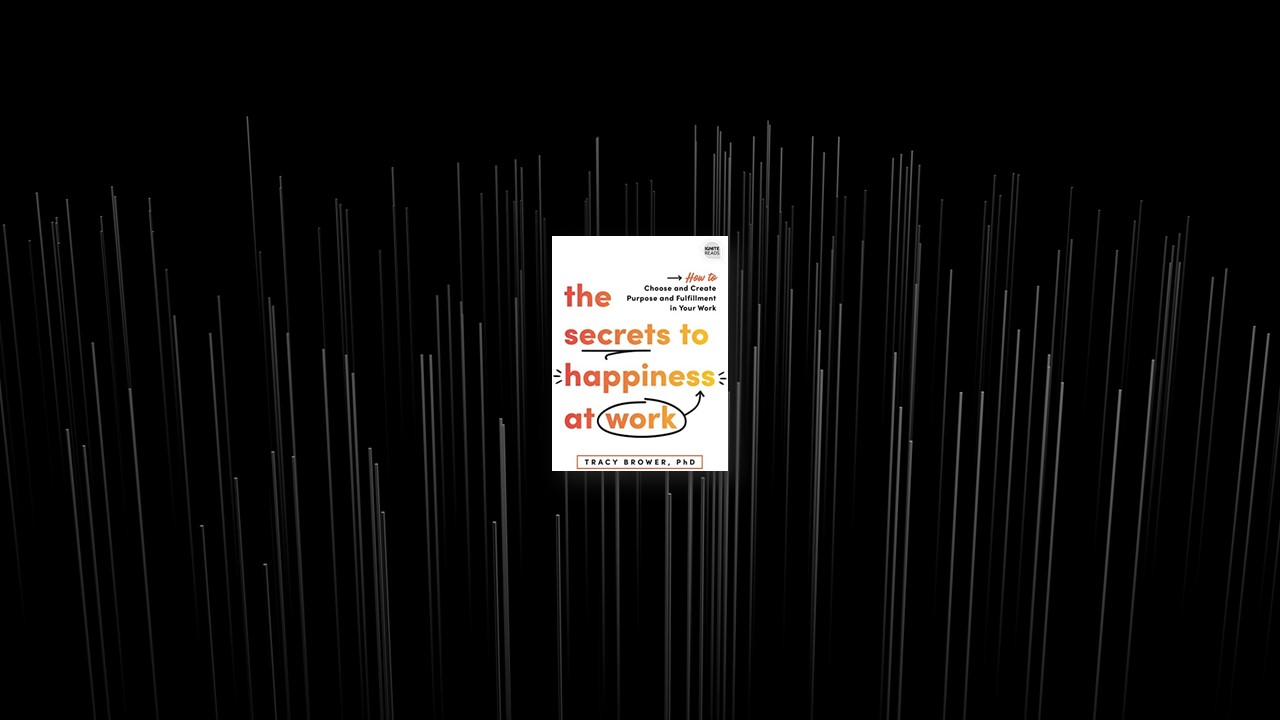Choosing Joy
Joy at work isn’t something we should wait for. True happiness is something we can choose and create. When you’re selecting a company, leader, or job, you can choose joy. When you’re influencing your responsibilities and working together with colleagues, you can choose happiness. And when you’re making sense of your work, you can choose a joyful approach.
While this empowerment is heady, it can also be daunting. As Marianne Williamson stated, “Our deepest fear is not that we are inadequate. Our deepest fear is that we are powerful beyond measure.” If we’re capable of choosing joy, then we are also responsible for our joy.
In terms of responsibility, it’s a both-and situation. As individuals, we can appreciate this concept of agency—that we are agents of our own future. But there is also structure, the social systems and organizational systems that dictate many of our experiences. It is fair that we consider both but also that we realize “they are us.” We can influence other people, we can lead—even if we are not formal leaders—and we can demonstrate our values. Socially speaking, the most important way people learn is through modeling—through observing other people—so we have greater influence than we may even realize, simply through demonstrating our values and inspiring joy in our own work.
Choosing Purpose
When experts provide advice on how to have a great life, following your passion is a frequent mantra. Just find what you love, they tell us, and you will have greater levels of joy and work-life fulfillment.
This is true, but the process of finding purpose and pursuing passion can be mystifying for many. It just seems awfully big and significant. How can we consider something so heady when we’re just trying to bridge the distance from our morning coffee to our evening glass of wine?
Embrace the first person. First, when you consider what you love to do, put yourself in the first person. Imagine yourself in a situation you might love. Rather than considering the situation in the third person—from a distance or in the abstract—imagine yourself actually doing the tasks or activities associated with what you’re considering.
An Ohio State University study found first-person envisioning fools the part of your brain that pays more attention to common biases or social judgments. Don’t let limiting beliefs like “men are less suited for careers in early childhood education” or “women should steer away from the sciences” override your preferences. It turns out imagining yourself in situations can help you establish a more clear sense of your passions. This can—and should—shape your pursuits.
Choosing Culture
In an age where every company tells you it values work-life fulfillment, how can you tell whether a company means it? What it will really be like if you join the organization? If you’re already part of a company, how can you help them practice what they preach? Here are a few ways to tell that a company truly values work-life fulfillment, along with some suggestions on how to bring any existing culture up to speed!
Consider their policies and practices. Ask about the company’s specific policies and practices supporting work-life fulfillment. What are their approaches to vacation, leave, benefits, or working from home? Listen for what they have established formally—as written policies—and which are informal or the result of a particular leader’s bent. If your leader changes (which is typical in corporate life), what policies will you have to fall back on? Be sure the written policies are robust enough to support work-life fulfillment even if your leadership shifts.
Watch how they work. Learn more about how others at the company work. Their behavior is the best barometer of company norms, “what goes,” and whether people can work alternative hours. Can people come in early on summer days and leave early once in a while to get to the beach or the golf course? Do people head out of the office to catch their daughter’s soccer game and then turn on later in the evening to finish their project? Are people open and transparent about their working habits, or do they have to keep quiet about their lives outside work? Look for companies where people work hard to accomplish results but where they can do so with flexibility.
Choosing Relationships
We all need time alone as well as time with others, and you’ve known that having good work friends can help you be more satisfied and stay at your job longer. But having great work relationships is also critical to cultivating joy, mental health, and overall well-being. Friends help you gain perspective, tap into self-control, and offer your best—at work and in your community.
Seek out tasks. One of the most powerful ways to build relationships at work is…well…through the work. While team building is a nice-to-have, winning the three-legged race with a colleague isn’t the best way to cement a bond. Working on a tough project together, collaborating on a challenging topic, or working together on a difficult customer issue are much more likely to ensure long-lasting connection.
Avoid competing. While competition is seemingly part of all kinds of work, it can be more impactful to find ways to cooperate internally and ensure competition is turned outside the organization. Working together to beat the competition or create new innovations that will help your business recover after an economic downturn will win the day and will make your time with colleagues more rewarding.
Help others get ahead. Do your best work so others can do theirs. Follow up, follow through, and be responsive to others around you so they can in turn do good work. Compassion toward people at work will help remove friction when there are so many other, non-work-related challenges all of us must face.
Choosing Growth
When you stretch, you tend to be more stimulated and satisfied in your work. When you can do a job without thinking about it, things can become too routine, and you risk burnout. In fact, a challenge and the unknown (“How should I handle this situation?”) can be very motivating. In addition, saying yes increases the likelihood that you can fully contribute your gifts and skills and find meaning in your work.
Saying yes is all about trust.
Trust yourself. You should always be learning, developing, and nurturing your talents. When new opportunities come up or you’re invited to take on that new project, trust yourself and your skills. Know your limitations so you don’t say yes to the wrong things.
Trust others. When you’re offered the opportunity to take on more responsibility, trust the people who have assessed you so positively. Sometimes, we can be our own harshest critics, and it can be helpful to be more gentle. See yourself through the optimistic lens others have on you. When you say yes to a stretch opportunity, ask what it is the person has seen in you, and ask for support as you take on that next role. Trust others are seeing legitimate talent within you and will help you be successful.
Trust the timing. You can’t always know whether the timing for a new opportunity is perfectly right, because life always includes a lot of other variables. If you take that promotion, how will it affect your availability for your relationships with partners or friends? How might it impact the energy you have for your family or hobbies? My advice: give it a try. When you do new things, you’ll have to invest time and effort, but you’ll also find that overall, you’re more energized by the challenge and therefore actually have more time and capacity to give for the other important parts of your life.
Choosing Success
Who doesn’t want that? In a new study, teams that played a collaborative (video) game together for just forty-five minutes were able to increase their productivity on a task by 20 percent.
Perhaps all those expensive team-building programs or outlandish group retreats are overreaching. Perhaps all you need to build culture and improve performance is a gaming council and some willing colleagues.
Play strengthens teams and improves results, and it is also good for your career growth. Company cultures that allow for play are better able to tap into the best in their employees, and employees themselves can bring more effectiveness into their work.
Here are four reasons you should play more too:
- Play fosters innovation.
- Play unites team members.
- Play lets us bring more of ourselves to work.
- Play helps us blow off steam.
From innovation and unity to expressing your talent and reducing stress, the reasons for play are compelling. So how do you embrace play? Here are four recommendations.
- Adopt a playful mindset.
- Make the ordinary more creative.
- Be present.
- Tap into things that bring you joy.
Choosing Alternatives
Sometimes you may find yourself in a job you don’t love or bored with your work, but you can thrive anyway. On the other hand, there may be times when you want to consider leaving your job—and renewing your path to happiness.
You know that to grow your career, you must perform with gusto in your current role. That can be tough, however, if it doesn’t seem like a great fit or if it doesn’t inspire you. Sometimes the path to your next opportunity can be a bit rocky or a bit bland. Either way, a reset may be necessary. Here’s how to not only bide your time until your next role but to thrive and choose joy as you strive toward the next career step.
Make friends. Find people at work with whom you can build a relationship and whom you appreciate. If your job is especially unpleasant, the people slogging through next to you can be the most important part of your survival. Misery likes company, yes, but even more, people can help pick you up when you’re down.
Focus on the positive. If you’re not loving what you do, focus on small, positive elements. Perhaps the commute is easy or the hours are good. If you don’t like the content of your work, maybe at least the company has a constructive culture. Being grateful for (even) small things will do worlds for your attitude and your survival until the next opportunity presents itself.
Focus on what’s next. While today’s work may not be all you hoped it would be, you’re always on a path toward what’s next. Intentionally set your vision on your next role. Imagine what you will do, how you’ll build your skills, and the ways you’ll reach out to gain support from mentors. The clearer you are about what’s next, the more you can make positive efforts toward that next step.
Push your patience button. When our friend’s son whines for what he wants, he tells him, “Push your patience button.” This is good advice for adults too. Not every job will be rainbows and butterflies, so be patient with where you are. Careers need to grow over time, and time can be the operative word. All careers also go through ups and downs. So whether you’re developing toward the next step or in a rut on your career journey, be patient. Know things will change—often faster than you think.
Overall, know that a not-so-great job won’t last. The leader will change. The company will evolve. And the content of the work will develop. Hang in there, and your positive approach over time will certainly pay off in your next great opportunity, and it will contribute to greater joy in the present.


